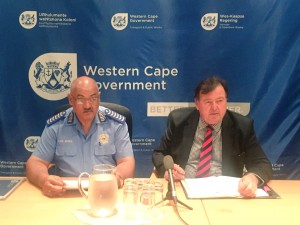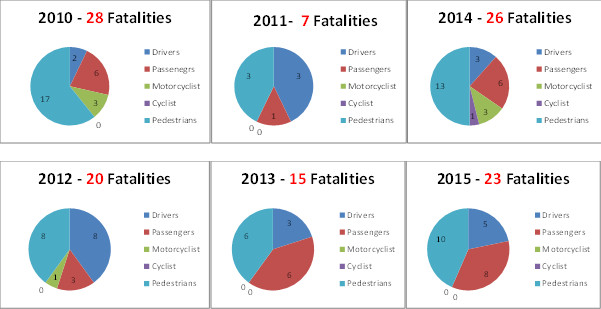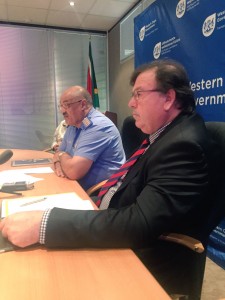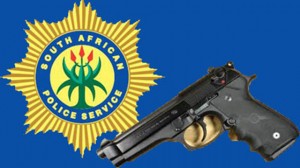
As we approach this year’s notorious Easter period, we are confident in the plans that we have put in place to respond to the increased traffic volumes and activity on our roads, which have come to characterise this period.
We have long known that increased traffic volumes, in turn, result in the increased risk of crashes and serious injury on our roads.
Our plans have always had to be specifically crafted to respond effectively to the extraordinary challenges that the Easter period brings with it. The plan that we present to you today we hope will do just that, and ensure that law and order are maintained, and that injury or death on our roads is avoided.
Our Provincial Traffic Services, under the capable leadership of Chief Kenny Africa, will work closely with our road safety partners and road users across the province. We hope that our collective efforts will yield a safer Easter period for all road users travelling to and from their various destinations.
Easter Fatality Statistics
Since 2009, we have seen high fatalities over the Easter weekend due to the ever-increasing number of vehicles, bound for various destinations, on our roads during this time. Pedestrians have continually claimed the lion’s share of the total fatalities over the Easter period, with vehicle occupants (drivers and passengers) also having high fatalities. Over the past few Easter weekends, the fatalities have been:

Safely Home’s “First Kiss” Campaign
There were an alarming 21 fatalities on Western Cape roads this past weekend alone. Six drivers and nine passengers were amongst those senselessly killed. These horrific statistics are an indication of the conditions we are to expect this coming Easter weekend, and emphasise the need for all of us to ensure we take every possible measure to protect ourselves and our loved ones on the road.

The Safely Home road safety campaign calendar theme for March and April is personal responsibility. The theme urges all road users to #BeTheChange that they want to see on Western Cape roads.
Wearing a seatbelt is a basic precaution which too many Western Cape residents continue to ignore, with predictable results. To encourage road users to #BeTheChange, Safely Home has launched an advertising campaign called “First Kiss. The campaign is also live online on the Safely Home website and on Facebook and Twitter (@WCGovSafelyHome)
We urge everyone to watch First Kiss, which launched in cinemas and on SABC 1, 2 and 3 and ETV over the weekend, and on Western Cape radio stations yesterday. Billboards will be launched throughout the following weeks. The video can be viewed on our website, safelyhome.westerncape.gov.za. The advertisement is aimed at informing the public of the risks of not ensuring that every single person in the vehicle is buckled up, including those in the back.
An Integrated Operational Plan
The Easter Operational Plan is evidence-driven, and has identified high-risk routes that have seen some of the more serious crashes over the Easter period in recent years.
The plan is a phased approach that will span from the 18th of March 2016, last weekend, spanning 50 days to the long weekend at the beginning of May 2016. Interventions and resources will be directed strategically to these areas to target the errant behaviour that causes fatal crashes, namely excessive alcohol consumption, fatigue, and excessive speeding, which are often both causal and aggravating factors to injury or death. Drivers and passengers not wearing seatbelts are also likely to suffer the same fate.
Drastically increased traffic volumes are expected on the N1, N2, R27, N7, R300, and the coastal towns, with many people expected to be on these routes as they travel to their various destinations. During this time, operational activities will include vehicle checkpoints, camera systems, and speed operations, as well as operations focussed on driver and vehicle documentation, moving violations, and seat belts/child restraints operations.
We are grateful to have Municipal Traffic Departments, the South African Police Service (SAPS), the National Traffic Police Unit (RTMC), SANTACO, Municipal police as well as other law enforcement agencies, assisting us, in partnership during this weekend’s various operations. By working together, we will have a bigger impact on making our roads safer.
We will be conducting various joint operations across the Province targeted at both private and public transport, focussing on issues such as:
- Driver fitness
- Vehicle fitness
- Compliance
- Load management
- Speed
- Dangerous driver behaviour
- Pedestrian behaviour
Traffic Law Enforcement agencies will also have operations aimed at preventing the unlawful transportation of illegal substances, driving a motor vehicle under the influence of alcohol, and fatigue management. Apart from roadside activities, traffic officials will also promote visible traffic policing and operational readiness, including the further implementation of our successful “sticker project”, targeted specifically at the roadworthiness of public transport vehicles that will be embarking on long trips across the province, and beyond, transporting thousands of holiday-makers to their various destinations.
We will continue with the deployment of our brand new hand-held devices to assist Provincial Traffic Officers over this Easter period. These devices were first deployed over the festive season, making a big difference to our enforcement efforts. The hand-held devices will be used by traffic officers in the field, as a fast, information-verifying tool that will assist enforcement.
The devices have been entirely developed and tested over the past two years by the Western Cape Department of Transport and Public Works, and will be in operation across the Western Cape; a first of its kind in South Africa.
The devices allow traffic officers real-time access to the Automatic Number Plate Recognition (ANPR) camera system, which is linked to the eNaTIS database where all vehicle and driver information is stored. We will be using both our ASOD/ANPR camera systems as a force multiplier over this Easter period to bolster the efficacy of our enforcement efforts. Our Average Speed Over Distance (ASOD) camera enforcement network has already been extended to two additional sections of the N2, following previous activations along the R61, the R27, and most of the N1. The total coverage by the system is 452kms. As part of the Easter Operational Plan, we will also have traffic officers deployed around the clock at some of our ASOD stretches to apprehend reckless speedsters on the spot and issue them with the appropriate fine or arrest them if they are found to have been speeding excessively.
We are pleased to announce that 35 Provincial Traffic Officers/Vehicles will be equipped with body worn/dash-cam cameras for live streaming of video footage to enhance our enforcement efforts through the use of technology.
Conclusion
As with any time of the year, responsible road use and behaviour saves lives. We continue to urge all road users to be mindful of the rules of the road at all times, and motorists, particularly during this Easter Weekend:
- Not to speed
- Not to drink and drive
- To be extra mindful of pedestrians (who make up half of all the fatalities in the province)
- Not to use cellphones while driving
- To ensure that they buckle up, and most importantly that children in the vehicle are buckled up
Motorists are also urged to be extra vigilant from 18:00 in the evening when most crashes are recorded on our roads. We are constantly reviewing our strategies when it comes to traffic law enforcement and best road safety practice.
We will continue to employ innovation and technology in making our roads safer for the many that use them. Working together over this Easter period is the only way we are likely to improve safety and decrease the number of lives lost senselessly on our roads. In doing so, we can ensure that after our various travels, we all get Safely Home.










